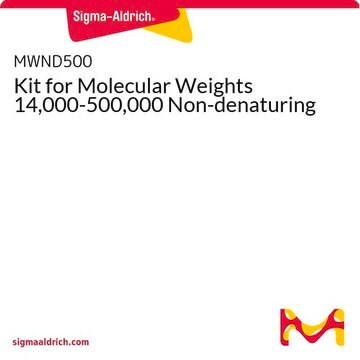S8445
SigmaMarker™
wide range, mol wt 6,500-200,000 Da
Synonyme(s) :
protein markers, protein standards
About This Item
Produits recommandés
Niveau de qualité
Forme
lyophilized powder
Utilisation
sufficient for 10-20 large gels (16 × 18 cm)
sufficient for 20-30 mini-gels (10 × 10 cm)
1 vial sufficient for 50-100 PhastGels
Poids mol.
6,500-200,000 Da
Température de stockage
2-8°C
Vous recherchez des produits similaires ? Visite Guide de comparaison des produits
Application
Autres remarques
Aprotinin, bovine lung (6,500)
α-Lactalbumin, bovine milk (14,200)
Trypsin inhibitor, soybean (20,000)
Trypsinogen, bovine pancreas (24,000)
Carbonic anhydrase, bovine erythrocytes (29,000)
Glyceraldehyde-3-phosphate dehydrogenase, rabbit muscle (36,000)
Ovalbumin, chicken egg (45,000)
Glutamic dehydrogenase, bovine liver (55,000)
Albumin, bovine serum (66,000)
Phosphorylase B, rabbit muscle (97,000)
β-Galactosidase, E. coli (116,000)
Myosin, porcine heart (200,000)
Reconstitution
Informations légales
Produit(s) apparenté(s)
Mention d'avertissement
Danger
Mentions de danger
Conseils de prudence
Classification des risques
Eye Irrit. 2 - Resp. Sens. 1 - Skin Irrit. 2 - Skin Sens. 1
Code de la classe de stockage
11 - Combustible Solids
Classe de danger pour l'eau (WGK)
WGK 3
Point d'éclair (°F)
Not applicable
Point d'éclair (°C)
Not applicable
Équipement de protection individuelle
dust mask type N95 (US), Eyeshields, Faceshields, Gloves
Certificats d'analyse (COA)
Recherchez un Certificats d'analyse (COA) en saisissant le numéro de lot du produit. Les numéros de lot figurent sur l'étiquette du produit après les mots "Lot" ou "Batch".
Déjà en possession de ce produit ?
Retrouvez la documentation relative aux produits que vous avez récemment achetés dans la Bibliothèque de documents.
Notre équipe de scientifiques dispose d'une expérience dans tous les secteurs de la recherche, notamment en sciences de la vie, science des matériaux, synthèse chimique, chromatographie, analyse et dans de nombreux autres domaines..
Contacter notre Service technique









